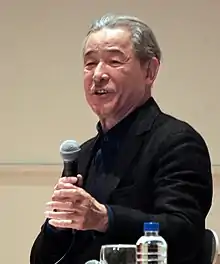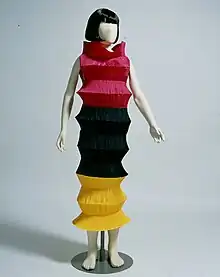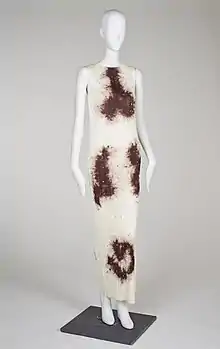Issey Miyake
Issey Miyake (Japanese: 三宅 一生, Hepburn: Miyake Issei, [mijake iꜜsseː] 22 April 1938 – 5 August 2022)[1] was a Japanese fashion designer. He was known for his technology-driven clothing designs, exhibitions and fragrances, such as L'eau d'Issey, which became his best-known product.
Issey Miyake | |
|---|---|
 Miyake in Tokyo, 2016 | |
| Born | Kazunaru Miyake 22 April 1938 |
| Died | 5 August 2022 (aged 84) |
| Education | Tama Art University |
| Notable work | L'eau d'Issey, Pleats Please, Bao Bao bags |
| Awards | Praemium Imperiale |
Life and career
Miyake was born Kazunaru Miyake (三宅 一生, Miyake Kazunaru)[2] on 22 April 1938 in Hiroshima. He was still living in the city seven years later when the U.S. military dropped an atomic bomb there in August 1945.[3] He first disclosed this in 2009, when Barack Obama advocated for global nuclear disarmament.[4]
As a child, he wanted to become a dancer. His interest in fashion started by studying his sister's fashion magazines. He studied graphic design at the Tama Art University in Tokyo, graduating in 1964. He entered designs into fashion competition at the Bunka Fashion College in Tokyo. However, he did not win a competition due to his lack of pattern-making or sewing skills. After graduation, he enrolled in the Chambre syndicale de la couture parisienne school in Paris and was apprenticed to Guy Laroche as assistant designer. He also worked with Hubert de Givenchy, drawing 50 to 100 sketches daily.[5]
In 1969, he moved to New York City, where he met artists like Christo and Robert Rauschenberg. He was enrolled in English classes at Columbia University and worked on Seventh Avenue for designer Geoffrey Beene.[5] Returning to Tokyo in 1970, he founded the Miyake Design Studio, a high-end producer of women's fashion.
From a young age, Miyake respected artist Isamu Noguchi, whose novelty and sense of fun in his designs inspired Miyake. He was also inspired by fashion designer Madeleine Vionnet's use of geometric calculations and "a single piece of beautiful cloth".[6] In Paris, he visited several museums and he mentioned that he was influenced by sculptors such as Constantin Brâncuși and Alberto Giacometti.[5]
San Francisco Chronicle fashion editor Sylvia Rubin credits Miyake together with Babette Pinsky with "reinventing" the Mariano Fortuny pleat in the 1980s.[7]
In the late 1980s, he began to experiment with new methods of pleating that would allow both flexibility of movement for the wearer as well as ease of care and production. The garments are cut and sewn first, then sandwiched between layers of paper and fed into a heat press, where they are pleated. The fabric's 'memory' holds the pleats and when the garments are liberated from their paper cocoon, they are ready-to wear. He did the costume for Ballett Frankfurt with an ultra feather-polyester jersey permanently pleated in a piece named "the Loss of Small Detail" William Forsythe and also work on ballet "Garden in the setting". Miyake realized that the new method of making clothes fit well in dancers. After studying how dancers move, he sent 200 to 300 garments for dancers to wear a different one in each performance of The Last Detail. This led to the development of the Pleats, Please range and inspired him to use dancers to display his work.[5]
He had a long friendship with Austrian-born pottery artist Dame Lucie Rie. She presented him with her archival ceramic buttons, which he integrated into his designs.[8]
He also developed a friendship with Apple's Steve Jobs, who came to him after seeing the uniforms Miyake designed for employees of Sony's factories. At Jobs's request, Miyake designed similar vests for Apple employees, but Jobs encountered strong opposition to the idea of a uniform.[9] Nonetheless, Miyake went on to produce the black turtlenecks which would become a part of Jobs' signature attire. Jobs said, "So I asked Issey to make me some of his black turtlenecks that I liked, and he made me like a hundred of them."[10]
Legendary designer Geoffrey Beene stated that he admired Issey Miyake for Miyake's technique, this in an interview with poet/artist Steven Vita in Veery journal, 1991.[11]
In 1992 Issey Miyake designed the Lithuanian national teams official uniform for the 1992 Summer Olympics in Barcelona. [12]
In March 1992 he was quoted in the International Herald Tribune as saying "Design is not for philosophy—it's for life."[13]
Between 1996 and 1999 Miyake collaborated with artists for his Guest Artist series. The first collaboration was with the photographer and collage maker Yasumasa Morimura; the other artists were Nobuyoshi Araki, Tim Hawkinson, and Cai Guo-Qiang.[14][15] Miyake stated that his intention was not to answer the question "Is fashion art?" but instead to create an "interactive relationship" between the art and the people who admired it. By wearing the artworks upon their bodies, the wearers interacted with fashion and art simultaneously.[14]
In 1994 and 1999, Miyake turned over the design of the men's and women's collections respectively, to his associate, Naoki Takizawa, so that he could return to research full-time. In 2007, Naoki Takizawa opened his own brand supported by the Issey Miyake Group and was replaced as Creative Director by Dai Fujiwara, who ran the House of Issey Miyake until 2012. The design duties were split as of the Spring/Summer 2012 collections, with Yoshiyuki Miyamae appointed head designer of the women's collection and Yusuke Takahashi designing the men's line.
As of 2012, he was one of the co-Directors of 21 21 DESIGN SIGHT, Japan's first design museum.[16] From March 2016 the largest retrospective of his work was organized at The National Art Center, Tokyo, celebrating 45 years of career.[17]
Miyake died of liver cancer on 5 August 2022, at the age of 84.[18]
 1984 'Indigo Batik' cotton kaftan dress, RISD Museum
1984 'Indigo Batik' cotton kaftan dress, RISD Museum 1990 'Rhythm Pleats' collection
1990 'Rhythm Pleats' collection 1994 'Flying Saucer' dress. PFF collection
1994 'Flying Saucer' dress. PFF collection 1996-7 'Guest Artist' design, Yasumasa Morimura for Miyake, RISD Museum
1996-7 'Guest Artist' design, Yasumasa Morimura for Miyake, RISD Museum 1998 'Guest Artist' design, Cai Guo-Qiang for Miyake, RISD Museum
1998 'Guest Artist' design, Cai Guo-Qiang for Miyake, RISD Museum_(cropped).jpg.webp) Steve Jobs wearing his signature black mock turtle neck by Issey Miyake[10]
Steve Jobs wearing his signature black mock turtle neck by Issey Miyake[10]
Issey Miyake lines and brands
Miyake "oversaw the overall direction of all lines created by his company", even though the individual collections have been designed by his staff since his 'retirement' from the fashion world in 1997.[19][20]
- Issey Miyake – main collection line, subdivided into men (since 1978/85) and women (since 1971) collections, designed by Dai Fujiwara[21] (succeeded Naoki Takizawa in 2006 )[22]
- Issey Miyake Fête – colorful women's line that "draws on the technological innovations of Pleats Please"[23] (Fête means 'celebration' in French) (since 2004)
- Pleats Please Issey Miyake – polyester jersey garments for women that are first "cut and sewn and then pleated [...] (normally, fabric is first pleated and then cut and sewn [...])" "to permanently retain washboard rows of horizontal, vertical or diagonal knife-edge pleats". Miyake patented the technique in 1993[24]
- HaaT – women's line, designed by Miyake's former textile designer, Makiko Minagawa. HaaT means 'village market' in Sanskrit, and the word sounds similar to 'heart' in English[25]
- A-POC – 1998– custom-collection for men and women. Tubes of fabric are machine-processed and can be cut into various shapes by the consumer. A-POC is an acronym of 'a piece of cloth', and a near homophone of 'epoch'.[19][21][26]
- 132 5. Issey Miyake – an evolution of the A-POC concept. Works are presented as two-dimensional geometric shapes made from recycled polyethylene terephthalate mixed with natural fibers and dyes, which then unfold into structured garments.[27] (since 2014)
- me Issey Miyake – line of "exclusive one-sized shirts that stretch to fit the wearer" that are sold in a plastic tube, named Cauliflower for the non-Asian market.[28] (since 2001)
- Homme Plisse - mens clothing in the signature Issey Miyake pleating.
- IM Men - Mens line for casual wear
- Bao Bao Issey Miyake – line of bags
- Issey Miyake Watches – men's and women's watches
- Issey Miyake Perfumes – line of fragrances for men and women. See below
- Evian by Issey Miyake – Limited edition bottle designed by Issey Miyake for Evian water.
- Issey Miyake maintained a freestanding store, named ELTTOB TEP Issey Miyake (reverse of 'Pet Bottle') in Osaka, where the full array of lines is available.[29]
- 21 21 Design Sight (a play on 20/20 vision) is a museum-style research center for design, constructed by Tadao Ando, that was opened in Roppongi, Tokyo in March 2007. The center was headed by Issey Miyake (until his death in 2022) and four other Japanese designers, and operated by The Miyake Issey Foundation.[30][31]
- The Miyake Issey Foundation, founded in Tokyo in 2004, operates the 21_21 Design Sight center, organizes exhibitions and events, and publishes literature.
- Issey Skyline – produced in limited quantities to promote the release of the Nissan Skyline in 1982.
Perfumes
Like many fashion designers, Issey Miyake also had a line of perfumes. His first fragrance, L'eau d'Issey, was created by perfumer Jacques Cavallier.[32]
The scent was followed by L'eau d'Issey Pour Homme (for men) in 1994. L'eau Bleue d'Issey Pour Homme was introduced in 2004; and its evolution, L'eau Bleue d'Issey Eau Fraiche was introduced in 2006. Every year from 2007 on, Issey Miyake brought out a "limited time only" fragrance for ladies, for which he brought in a "guest" perfumer. In 2007, he launched 'Drop on a Petal', and in 2008 he launched 'Reflections in a Drop'. A new Issey Miyake men's fragrance, L'eau d'Issey Pour Homme Intense, was introduced at Nordstrom in the United States in June 2007, with a larger worldwide rollout following in September 2007. Issey Miyake fragrances are produced under a long-term agreement by the Beauté Prestige International division of Shiseido.
Awards
- In 2005, he was awarded the Praemium Imperiale for Sculpture[33]
- Miyake won the Arts and Philosophy Kyoto Prize in 2006[34]
- Japan's Order of Culture, 2010[35]
- XXIII Premio Compasso d'Oro ADI, 2014, for family of lamps IN-EI Issey Miyake, Artemide[36]
References
- Lies, Elaine (9 August 2022). "Issey Miyake, Japan's prince of pleats, dies of cancer aged 84". Reuters.
- ファッションデザイナーの三宅一生さんが死去、84歳…「イッセイミヤケ」世界で評価. Yomiuri Shinbun (in Japanese). 9 August 2022. Archived from the original on 13 August 2022. Retrieved 13 August 2022.
- Miyake, Issey (13 July 2009). "Opinion | A Flash of Memory". The New York Times. Retrieved 11 April 2022.
- "Japanese fashion designer Issey Miyake dies at 84". Archived from the original on 9 August 2022. Retrieved 9 August 2022.
- English, Bonnie (2011). Japanese fashion designers : the work and influence of Issey Miyake, Yohji Yamamoto and Rei Kawakubo. Oxford. ISBN 978-0-85785-054-6. OCLC 857064156.
{{cite book}}: CS1 maint: location missing publisher (link) - "Issey Miyake – MOVES – Documentary". Vimeo. Retrieved 16 August 2020.
- Rubin, Sylvia (27 April 2008). "She has that Babette look – 40 years later". San Francisco Chronicle.
- Knott, Becky (24 April 2017). "Lucie Rie: A Secret Life of Buttons • V&A Blog". V&A Blog.
- Davis, Wynne (10 August 2022). "The story of Steve Jobs and Issey Miyake's friendship (and a nixed Apple uniform)". NPR. Retrieved 13 August 2022.
- Steve Jobs' black turtleneck reportedly explained in biography (Nathan Olivarez-Giles, Los Angeles Times, October 11, 2011)
- "Geoffrey Beene Interview". V E E R Y J O U R N A L. Retrieved 21 August 2019.
- "Arena Magazine: Total Sport featuring Issey Miyake, 1992 | Archive Fashion Scan". ARCHIVE.pdf. Retrieved 7 April 2023.
- http://www.poemhunter.com/issey-miyake/ International Herald Tribune, Paris, 23 March 1992
- "Issey Miyake Guest Artist series No. 1 Yasumasa Morimura". FIDM Museum. 29 June 2012. Retrieved 18 April 2022.
- "Dress by Issey Miyake and Cai Guo-Qiang, 1999". Metropolitan Museum – Collections Search. Metropolitan Museum of Art. Retrieved 15 April 2022.
- "Art Space Tokyo". 21_21 Design Sight: Tokyo Art Maps. Retrieved 9 January 2012.
- "The work of Miyake Issey". domusweb.it. Retrieved 9 May 2016.
- "三宅一生さん死去 世界的な衣服デザイナー" (in Japanese). 9 August 2022. Retrieved 9 August 2022.
- "New Page 1". Archived from the original on 24 October 2007. Retrieved 31 May 2008. Contemporary Magazine – The A-POC epoch
- "Issey Miyake, Fashion Designer". Archived from the original on 12 June 2008. Retrieved 31 May 2008. Fashion Windows – Issey Miyake
- "DNR". Archived from the original on 13 February 2008. Retrieved 31 May 2008. DNR -A-POC making
- "Issey Miyake | Marie Claire". Archived from the original on 13 May 2008. Retrieved 31 May 2008. Marie Claire – Issey Miyake
- http://metropolis.co.jp/tokyo/551/goods.asp Archived 10 June 2008 at the Wayback Machine Metropolis – Festival of Style
- "Techno frock". The Age. 17 June 2006. Retrieved 3 May 2016.
- Rath, Paula (12 July 2006). "Worldly textiles". Honolulu Advertiser. Retrieved 3 May 2016.
- Siaotong, Bernardo. "Epoch of A-POC". Image Venue. Retrieved 3 May 2016.
- ISSEY MIYAKE INC. "ISSEY MIYAKE INC". Retrieved 9 May 2016.
- "'me'". designboom. Archived from the original on 22 May 2008. Retrieved 31 May 2008.
- http://www.hintmag.com/shoptart/shoptart_apr07.php Archived 4 May 2008 at the Wayback Machine Hint Mag – Different Strokes
- "21_21 Design Sight". Archived from the original on 9 April 2008. Retrieved 31 May 2008. 21_21 – The directors
- "News 2005 0714". Archived from the original on 7 August 2009. Retrieved 31 May 2008. Mitsui Fudosan – "21/21 Design Sight" to be established
- Greenwood, Helen (3 September 2009). "Intense is a classic update of a classic scent". The Sydney Morning Herald.
- "Nomes da Moda: Issey Miyake". Mondo Moda (in Brazilian Portuguese). 8 December 2011.
- Rowe, Peter (11 March 2007). "Intelligent Design-Issey Miyaki". The San Diego Union-Tribune. Archived from the original on 4 March 2016. Retrieved 3 May 2016.
- "Issey Miyake Receives Top Award". Vogue. 26 October 2010. Retrieved 3 May 2016.
- "Compasso d'Oro: i vincitori (e i momenti più belli)". Casa & Design (in Italian). repubblica.it. 29 May 2014.